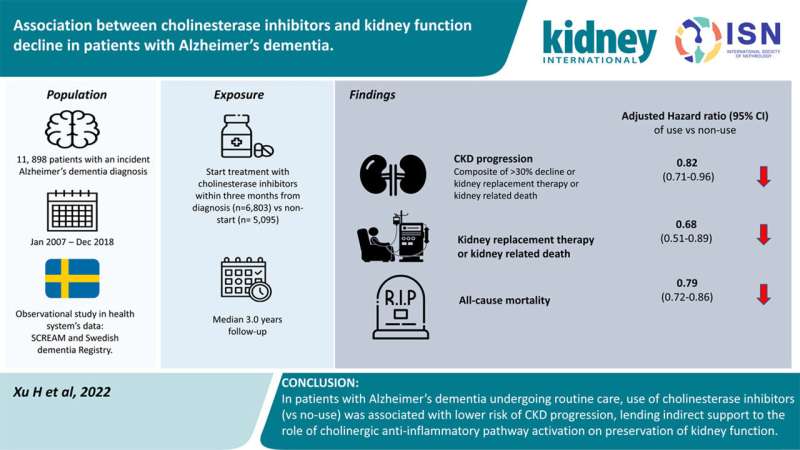Cholinesterase inhibitors found to help Alzheimer's patients preserve kidney function

Researchers from the Department of Neurobiology, Care Sciences and Society (Eriksdotter group) in collaboration with the Departments of MEB (Carrero group) and Clintec (Bruchfeld group) at KI have recently had their study published in Kidney International. This paper is the first study linking activation of cholinergic anti-inflammatory pathways to kidney damage in humans.
"In this observational study, we move the pre-clinical research forward by linking the use of cholinesterase inhibitors with preserving kidney function," says Hong Xu, Assistant professor and first author of the article.
Cholinesterase inhibitors are a group of drugs recommended for the treatment of Alzheimer's dementia. Although the target organ for this group of drugs is the brain, inhibition of the enzyme cholinesterase may affect the kidney through stimulation of the vagus nerve and anti-inflammatory effects.
The study shows that, in patients with Alzheimer's dementia, use of cholinesterase inhibitors is associated with a lower risk of chronic kidney disease progression compared with no-use.
This is the first study to examine cholinesterase inhibitors as a potential treatment for kidney disease. Recent preclinical studies suggest that the cholinergic anti-inflammatory pathway may play an important role in the treatment of chronic kidney diseases.
The study is the first step in determining whether cholinesterase inhibitors benefit patients with chronic kidney disease. This would constitute drug repurposing which is cost and time-effective: the cholinesterase inhibitors have been marketed since the 90s, their risk profiles are known and costs low.
The study was based on data from SveDem (Swedish registry for cognitive/dementia disorders) and the SCREAM biomarker registry for renal function (The Stockholm CREAtinine Measurements project) involving 6,800 persons treated with cholinesterase inhibitors and a matched control group of 5,000 untreated persons with Alzheimer's disease.
The results showed that treatment with cholinesterase inhibitors was associated with a 18% lower risk of kidney function decline over ten years follow up, and a 21 % lower mortality in individuals with Alzheimer's disease compared with the untreated.
The finding supports preclinical research documenting a role for the cholinergic anti-inflammatory pathway in preserving kidney function.
In the next step, the researchers will investigate the possibility of performing a clinical trial to confirm the protective effect of cholinesterase inhibitors in patients with chronic kidney disease.
More information: Hong Xu et al, Association between cholinesterase inhibitors and kidney function decline in patients with Alzheimer's dementia, Kidney International (2022). DOI: 10.1016/j.kint.2022.09.022




















